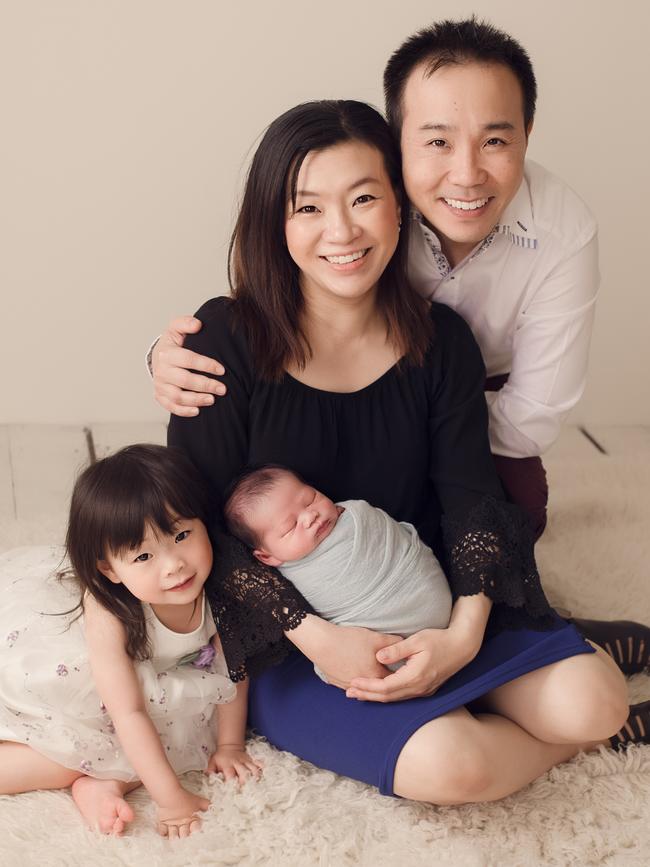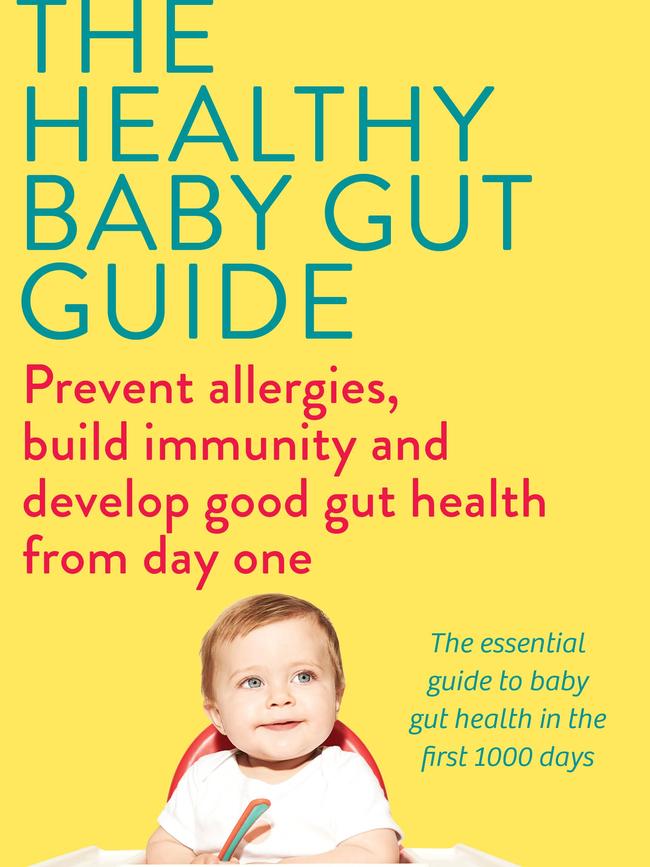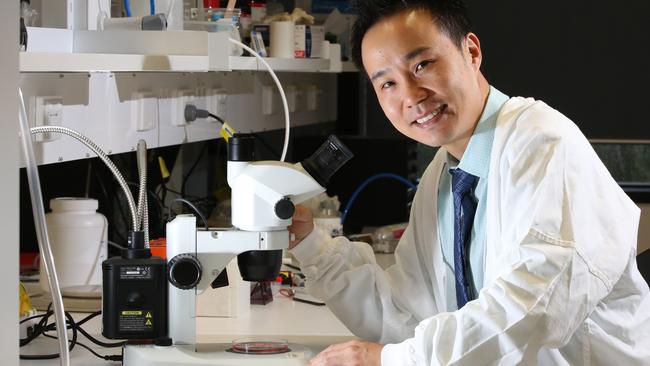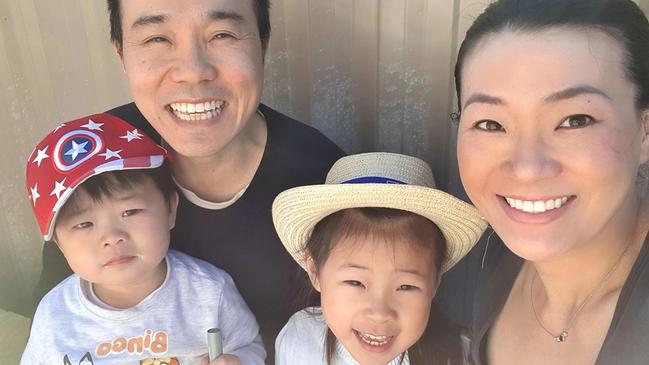Spread germs: Controversial way to prevent kids allergies
Pre-chew your baby’s food, suck their dummy and take them to a farm - that’s the controversial new expert advice on how to avoid childhood allergies.

QWeekend
Don't miss out on the headlines from QWeekend. Followed categories will be added to My News.
As a gastroenterologist well versed in the dangers of nasty bowel bugs, Dr Vincent Ho used to be a champion of sanitising and keeping fastidiously clean.
But how he has changed.
After four years researching his book The Healthy Baby Gut Guide: Prevent allergies, build immunity and develop good gut health from day one, Ho is now an advocate of pre-chewing your baby’s food, sucking on dummies and getting up close to farm animals.
Allergy, anaphylaxis to be examined in parliamentary inquiry
The app you need if you have a nut allergy
Going on a “babymoon” to a farm while pregnant, or even before pregnancy, is part of what he admits is controversial advice to prospective parents to take action to prevent allergies. Sydney-based Ho, 41, is a clinical gastroenterologist and senior lecturer at the University of Western Sydney. He has appeared on Dr Michael Mosley’s Better Guts program on SBS and is a regular contributor to online news and commentary site The Conversation.
His first experience in the world of allergies was when his then six-month-old, firstborn child Olivia was rushed to hospital after an adverse reaction to egg in a yum-cha restaurant.
It was, Ho says, the most harrowing and terrifying moment of his life.

This experience launched him onto “a mission” – years of detailed research into the science and mystery behind childhood allergies. He was shocked to discover emerging research linking childhood allergies with gut health, directly leading back to his own medical specialty.
He has since “done a complete 180” in his views – from sanitising “religiously” to advocating that pregnant women and babies be exposed to plenty of good microbes.
He believes parents can be proactive in preventing allergies and setting up a child’s immune system for life.
“From my background, I write a lot about gastroenteritis, and I’m very aware of gastrointestinal infections and getting sick from contact with pets and animals.
“I’m known for having a public profile on gastroenteritis and about cleanliness,” Ho says. “I know a lot about gut health but before I researched allergies, it never occurred to me to link that back to allergies and the immune system, particularly in children.
“With Olivia, we (with wife, pharmacist Cindy Luong, 38) were circumspect about a lot of exposure to germs. We made sure everything was as sanitised as possible. Everything was cleaned almost religiously.
“We had a dog (Bob, a now-deceased Maltese terrier) but we were hesitant to let Olivia have contact with him. We were worried she could contract an infection.
“We could have also spent more time getting her out playing in the park and coming into contact with all sorts of insects and the natural environment.” Ho’s book, released this week, is a practical guide for parents to give their kids the best chance at an allergy-free life.
His advice, he reassures, can be followed safely during times of viral outbreaks such as COVID-19.

Allergic diseases are increasing on an unprecedented scale and Australia has the highest rate of confirmed food allergy in the world. Food allergy is “rampant”, Ho says, and affects about 10 per cent of babies up to 12 months old.
For children aged between zero and four, there was a 5.5-fold increase in anaphylaxis from 1994 to 2005. Many of Ho’s immunology colleagues have told him they already have enough work to keep them going until retirement.
Experts believe the rise is due, in part, to a more limited exposure to beneficial microbes or “old friends” – harmless microbes that train the immune system to respond to threats.
In developed countries, this reduced exposure is due to a combination of cleaner sanitation, food and water, the widespread use of antibiotics, an increase in caesarean sections, a reduction in breastfeeding and less time spent outdoors in green spaces.
There are also hereditary factors to consider, as well as environmental influences such as herbicides and pesticides, solvents, air pollutants and exposure to phthalates and bisphenol-A (BPA) – compounds that make plastic more flexible.
Ho says the first 1000 days of life (from conception to age two) is when the gut microbiota – the village of bacteria, fungi and viruses in our gut – is being set and when parents can take action to ensure it develops properly.

Exclusive breastfeeding for six months is ideal, with solid foods introduced no earlier than four months but ideally around six months. The six to 12 month age is then a “critical window”, he writes, to introduce common allergenic foods to help the child develop a tolerance for them.
Ho provides a nine-week infant meal plan that gradually introduces egg, dairy, sesame, fish, peanut, wheat, shellfish, soy and tree nuts.
“You can very safely introduce allergenic foods to children before one year of age,” Ho says.
“If your baby develops a reaction to a particular food, do not give them any more of that food and you should seek the advice of an allergist.
“Between six to 12 months we made sure we exposed Olivia to a range of foods including peanuts and shellfish.”
Ho says he is very happy to report Olivia, now aged 5, has outgrown her egg allergy. But he was determined to do things differently with his second child, Brandon, 2, and made sure he was exposed to a diverse range of good microbes. He (eventually) convinced Cindy, his “city girl” wife, to go on a farm babymoon outside Sydney while pregnant with Brandon. After he was born, they allowed Brandon and Bob the dog to interact.
Ho and his wife sucked on Brandon’s dummy before popping it in his mouth and they were not fussy about sanitising every surface he touched.
Ho admits it was not easy to go against long ensconced habits of cleanliness. But he believes they have set Brandon up for an allergy-free future.
“It wasn’t easy for us to do,” Ho says.
“With sucking the dummy, we made sure we weren’t sick and also made a pact that we wouldn’t be sucking on the dummy if it fell on the floor.
“We’d wash it, then suck it and give it back to him. We didn’t do it all the time but it was a lot better than what we did with Olivia. I would not even have considered that with Olivia.”

Like many aspects of life, COVID-19 has thrown a spanner in the works and it might also have an impact in terms of worldwide allergy rates.
Regular sanitising of our hands and living environments may be the answer to beating this global pandemic but Ho says rising allergy rates may also be an unintended consequence.
“Hygienic practices and social distancing are necessary and good for reducing the rate of COVID-19 but I believe we will probably see an increase of childhood allergies,” he says.
“We could see a real breakout in terms of allergies around the world.
“And if children aren’t being exposed to the natural environment, that could be a real concern.”
COVID-19 must also be considered with pre-masticating and sucking on dummies. Don’t do this, Ho says, if a parent is unwell.
“For children to have a healthy immune system, they need to have exposure to a diverse range of microbes,” Ho says.
“There are things you can do as a mother in pregnancy and as a family. Personally, my wife and I are continuing to make sure that our kids are exposed to the natural environment as much as possible. I never wanted to be in that situation we had with Olivia again.” ■
The Healthy Baby Gut Guide: Prevent allergies, build immunity and develop good gut health from day one by Dr Vincent Ho, Allen & Unwin, $30.
